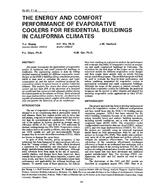This paper compares the performance of CO2 and R-22 in residential air-conditioning applications using semi-theoretical vapor compression and transcritical cycle models. The simulated R-22 system had a conventional component configuration, while the CO2 system also included a liquid-line/ suction-line heat exchanger. The CO2 evaporator and gas cooler were microchannel heat exchangers originally designed for CO2 . The R-22 heat exchangers employed the same microchannel heat exchangers as CO2 with the difference that we modified the refrigerant passages to obtain reasonable pressure drops. The study covers several heat exchanger sizes. The R-22 system had a significantly better coefficient of performance (COP) than the CO2 system when equivalent heat exchangers were used in the CO2 and R-22 systems, which indicates that the better transport properties and compressor isentropic efficiency of CO2 did not compensate for the thermodynamic disadvantage of the transcritical cycle in comfort cooling applications. An entropy generation analysis showed that the CO2 evaporator operated with fewer irreversibilities than did the R-22 evaporator. However, the CO2 gas cooler and expansion device generated more entropy han their R-22 counterparts and were mainly responsible for the low COP of the CO2 system.
Units: Dual
Citation: Symposium, ASHRAE Transactions, vol. 108, pt. 2
Product Details
- Published:
- 2002
- Number of Pages:
- 11
- File Size:
- 1 file , 330 KB
- Product Code(s):
- D-8864


